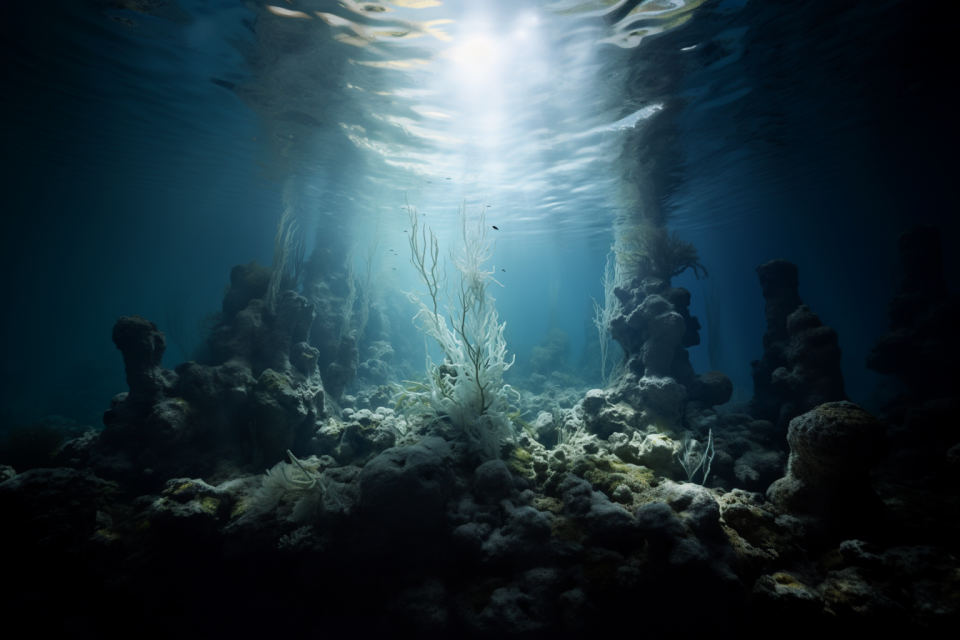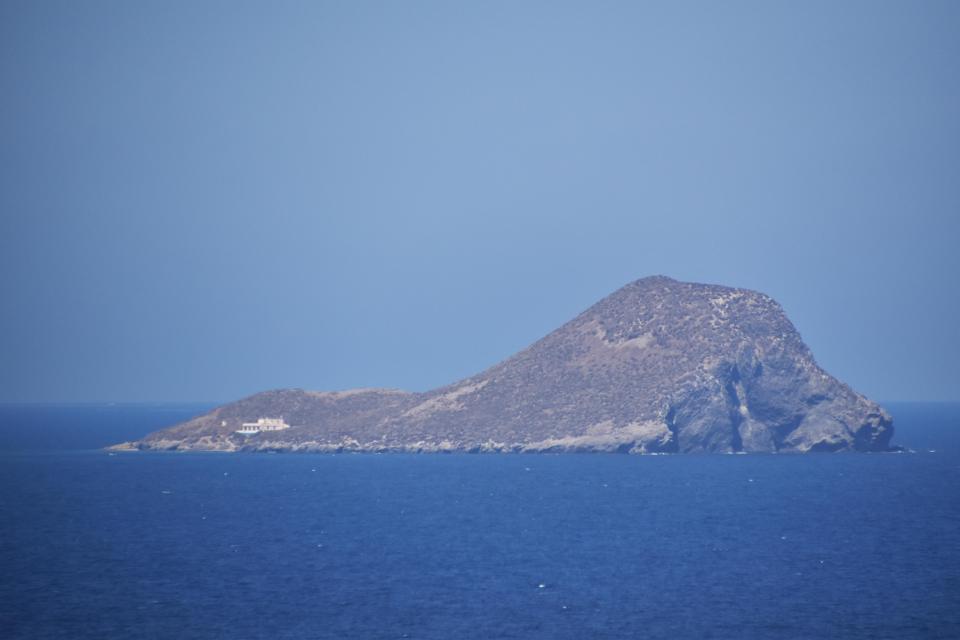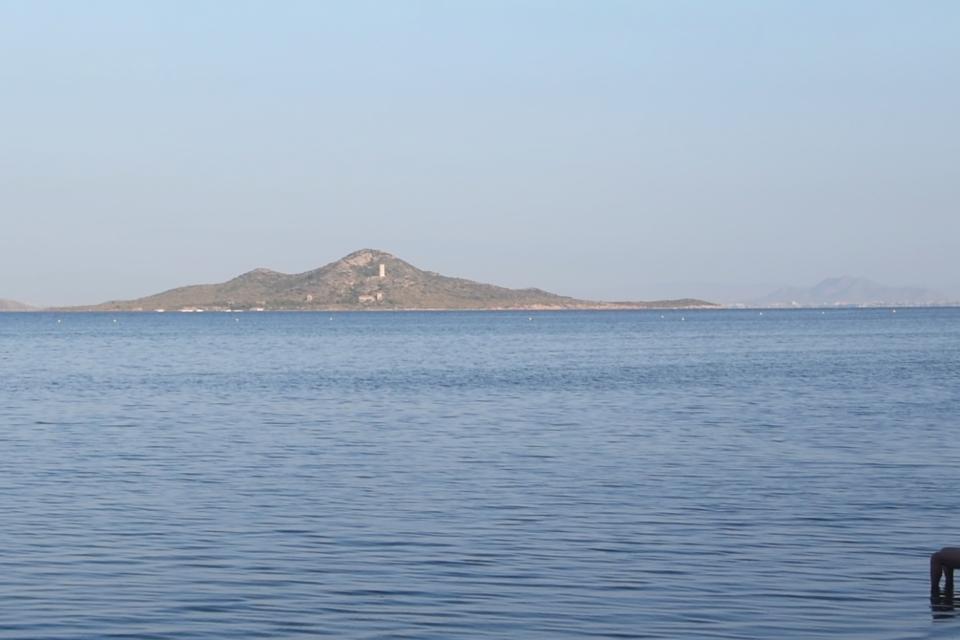Anoxia. A Constant Prelude
Anoxia. A Constant Prelude
Musical Performance and Screening of Fito Conesa's work
17 January 2024 at 19.00
Sala d’Actes P3 / Second Floor of the Art Centre
Musical adaptation with voice and electronic devices by Fito Conesa and Claudia Schneider of the work Anoxia. A Constant Prelude by Fito Conesa, brief conversation about the creation process of the musical and voice piece, and screening of the work.
Anoxia. A Constant Prelude*
Understanding banning to be part of the norm, turns conflict into something routine. For decades, doctors have recommended not swimming in the Mar Menor in certain situations. For years now, in the bay of Portmán (Murcia), a layer of black stone has been expanding, which, in a kind of consensus-dictatorship, we have decided to christen “black volcanic stone”, in an attempt to submerge the memory of mining in a transitional environmental alignment.
The ships that cross the Mediterranean from Barcelona, join points in a web of capricious constellations, like someone repeatedly joining the numbers on a dot-to-dot, over and over until the paper tears. Denial of late capitalism is, in truth, the natural consequence of our fear of not knowing how to manage the collapse, the change, the bad news. We are not capable of understanding the action and movement beyond the guilt that blocks us.
Anoxia. A Constant Prelude is an opera in three acts that suggests different approaches to the current problems of the Mediterranean Sea.
On the one hand, it brings us closer to ecosystemic degeneration and imminent ecocide, on the other, it portrays the network of toll roads that the big cruise ships trace over the seagrasses and, finally, it is also a song that challenges the viewer and brings them closer to the present situation of already-known but poorly-managed consequences. In short, Anoxia. A Constant Prelude is an opera that gradually recounts some of the most obvious problems that the Mediterranean Sea has been subjected to. It is a visual song that expands our questionable coexistence and narrates with warm glissandi the darkness that will become, but which does not get bogged down in fatality as the only possible melody. It is an audiovisual work built in several stages, with various voices, multiple sensibilities and real affinities: a naumachia in three acts.
Anoxia. A Constant Prelude won the 9th edition of the Video Creation Awards, a co-production of a video creation project between the Regional Centres of the System of Public Visual Arts Facilities of Catalonia**, Santa Mònica, the Generalitat de Catalunya’s Department of Culture and LOOP Barcelona.
Fito Conesa (Cartagena, 1980) is an artist and programmer. He has a degree in Fine Arts from the University of Barcelona and has created and given workshops for the education department of the ”la Caixa” Banking Foundation. He was also part of the tutorial team at Sala d’Art Jove (2012). His work has been exhibited at different museums and festivals, including the Oslo Screen Festival 2010, the LOOP Festival in Barcelona 2009-2012, Barcelona International Poetry Festival, Centro Cultural de España in Santo Domingo (Dominican Republic), Matadero Madrid and CaixaForum (Lleida, Tarragona, Barcelona).
He has participated in various publications, such as Zeitgeist: variations & repetitions (Save as… Publications, 2010), Unique Window Display (Loft Publications, 2009) and Suite for Ordinary Machinery (Save as… Publications, 2008). With the latter he became part of the library collections of Tate Modern (London), the Museo Nacional Centro de Arte Reina Sofía and MACBA.
From 2014 to autumn 2017, he directed and coordinated Habitació 1418, the CCCB and MACBA project for young people aged between 14 and 18.
Claudia Schneider has a degree in Architecture from the Barcelona School of Architecture, ETSAB. In parallel, she studied music at the Acadèmia Marshall in Barcelona, developing her singing training with Montserrat Aparici. She was awarded a grant for her third year of architecture studies by the Istituto di Architettura di Venezia and took advantage of her stay in Italy to further her studies as a singer at the Scuola Treviso.
She won the New Voices Competition organised by the Òpera de Cambra de Catalunya and obtained a scholarship to complete her lied training with Paul Von Schilhawsky and Dalton Baldwin.
She has focused on the world of contemporary opera, premiering works by Carles Santos, such as Ricardo i Elena, the circus opera Sama Samaruck Suck Suck and L’adéu de Lucrècia Borja and by Joan Albert Amargós, such as Eurídice y los títeres de Caronte. In 2016, at the Grec Festival, she premiered the robotic puppet opera El somni de Gulliver, with music by Elena Kats-Chernin and robotic art by Roland Olbeter.
She spends her life developing her two passions — singing and architecture — with the same force and dedication.
* Anoxia is the lack or absence of oxygen in the organs or tissues of an organism or water system.
** The Regional Centres of the System of Public Visual Arts Facilities of Catalonia are: ACVic Centre d’Arts Contemporànies (Vic); Bòlit, Centre d’Art Contemporani. Girona; Fabra i Coats: Contemporary Art Centre of Barcelona; M|A|C Mataró Art Contemporani; Mèdol – Centre d’Arts Contemporànies de Tarragona; Centre d’Art la Panera (Lleida); Lo Pati – Centre d’Art Terres de l’Ebre (Amposta); i Centre d’Art Tecla Sala (l’Hospitalet de Llobregat).





